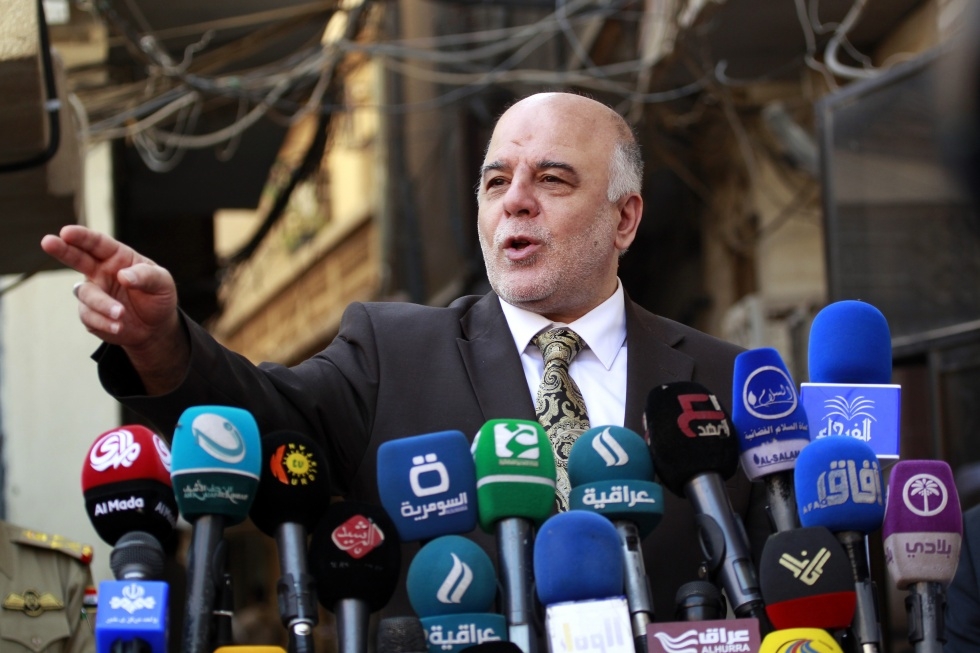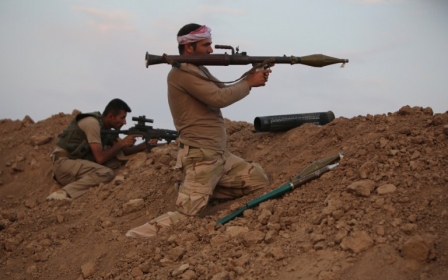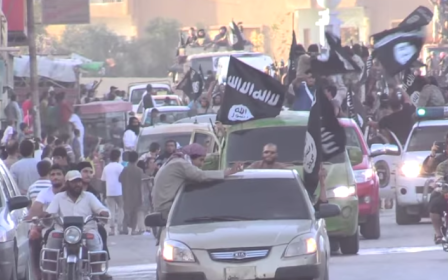Iraq government, Kurds strike deal on oil as Abadi moves against corruption

Iraq’s government and the autonomous Kurdish region have reached an agreement on resolving a longstanding dispute over the budget and oil, in a move seen as a key step in improving cooperation against Islamic State (IS) group militants.
A statement by Iraqi Prime Minister Haider al-Abadi’s office on Tuesday said the deal was approved during a cabinet meeting also attended by Kurdish Prime Minister Nechirvan Barzani.
The deal will come into effect at the start of 2015 and 250,000 barrels per day (bpd) of oil will be exported from the autonomous region and 300,000 from the disputed province of Kirkuk.
“We have reached an agreement with the Iraqi government which will benefit both parties and whereby we will export 250,000 bpd of regional oil and help the federal government export the Kirkuk oil,” Barzani told reporters.
The deal would see oil from the Kurdish region or claimed by its leadership exported via Kurdish pipelines but through the federal oil company.
In return, Baghdad will release the Kurdistan Regional Government's share of national revenue, which had been frozen for more than a year in retaliation for Arbil's efforts to export oil unilaterally.
It will also give a share of its military budget to the Kurdish peshmerga fighters.
"The federal prime minister has expressed his readiness to guarantee one billion dollars from the Iraqi budget for the peshmerga forces," Barzani said.
Abadi's office simply said that the Kurdish military would get a percentage of the federal armed forces' budget.
The news comes a day after Abadi dismissed 24 senior interior minister officers, according to a statement from his office issued on Monday.
It did not provide a specific explanation for their dismissal, but Abadi has been sacking and retiring a raft of top security officials since he took office three months ago.
"New officers were appointed as part of the drive to reform the security apparatus... and improve its efficiency in confronting terrorism," the statement said.
The latest announcement came 24 hours after he announced a corruption probe had uncovered the existence of 50,000 "ghost soldiers" on the army's payroll.
Abadi’s spokesperson said the drive to curb corruption which observers said reached unprecedented heights under his predecessor Nuri al-Maliki would spread to all state institutions.
The Iraqi premier has already fired or retired several generals who were seen as responsible for the armed forces' abysmal performance when the Islamic State (IS) group swept through swathes of the country in June.
He also dismantled the office of the commander in chief, an extra-constitutional body which Maliki had set up to retain effective control over the interior and defence ministries.
The battle against IS continues to be hard-fought and on Monday 16 Iraqi border guards were killed in a dawn assault by the militants near the border with Syria.
"Sixteen border guards, including a captain, were killed and four wounded in an attack targeting their headquarters in Al-Walid, near the Syrian border," Faleh al-Issawi, deputy head of Anbar provincial council, told AFP.
He said the attack occurred at around 6:00 am (0300 GMT).
A commander in the Iraqi border force and a police major confirmed the death toll.
Despite the attack, "Al-Walid is still in the hands of Iraqi forces," the major said.
The crossing is one of the country's most remote outposts and lies 500 kilometres (310 miles) west of Baghdad near the westernmost point in Anbar province where the borders of Iraq, Syria and Jordan meet.
IS fighters briefly held Al-Walid border crossing on June 23 but government forces have since reclaimed control of the area.
Parts of the vast Anbar province, which also borders Saudi Arabia, have been out of government control since the start of the year, months before IS launched a major offensive across Iraq in June.
Government forces backed by US-led airstrikes, Kurdish forces, Sunni tribal fighters and Shiite militiamen have in recent weeks gradually clawed back some of the land lost since June.
But IS fighters have held their ground in Anbar and tried to tighten their grip on the province by attacking government positions and buildings in its capital Ramadi.
Meanwhile US-led strikes continue to target the group’s militants. On Monday air raids struck dozens of their vehicles and bases, including an “electronic warfare garrison”, according to US military sources.
Between 28 November and 1 December coalition aircraft and drones bombed targets in Iraq and Syria, where they reportedly hit IS fighters besieging the town of Kobane as well as the group’s headquarters in the north-east Syrian city of Raqaa.
In Raqqa, they struck a tank, 14 other vehicles, an IS base and what they described as an electronic warfare garrison and a separate "jamming system," US Central Command said.
In Iraq, a further 28 strikes hit IS vehicles, artillery, bases and fighting positions near the towns of Mosul, Hit, Tal Afar, Tikrit and Ramadi.
The US-led campaign has been supported in Syria by forces from Bahrain, Jordan, Saudi Arabia and the UAE. In Iraq, Australia, Belgium, Britain, Canada, Denmark, France and the Netherlands have all taken part.
New MEE newsletter: Jerusalem Dispatch
Sign up to get the latest insights and analysis on Israel-Palestine, alongside Turkey Unpacked and other MEE newsletters
Middle East Eye delivers independent and unrivalled coverage and analysis of the Middle East, North Africa and beyond. To learn more about republishing this content and the associated fees, please fill out this form. More about MEE can be found here.




